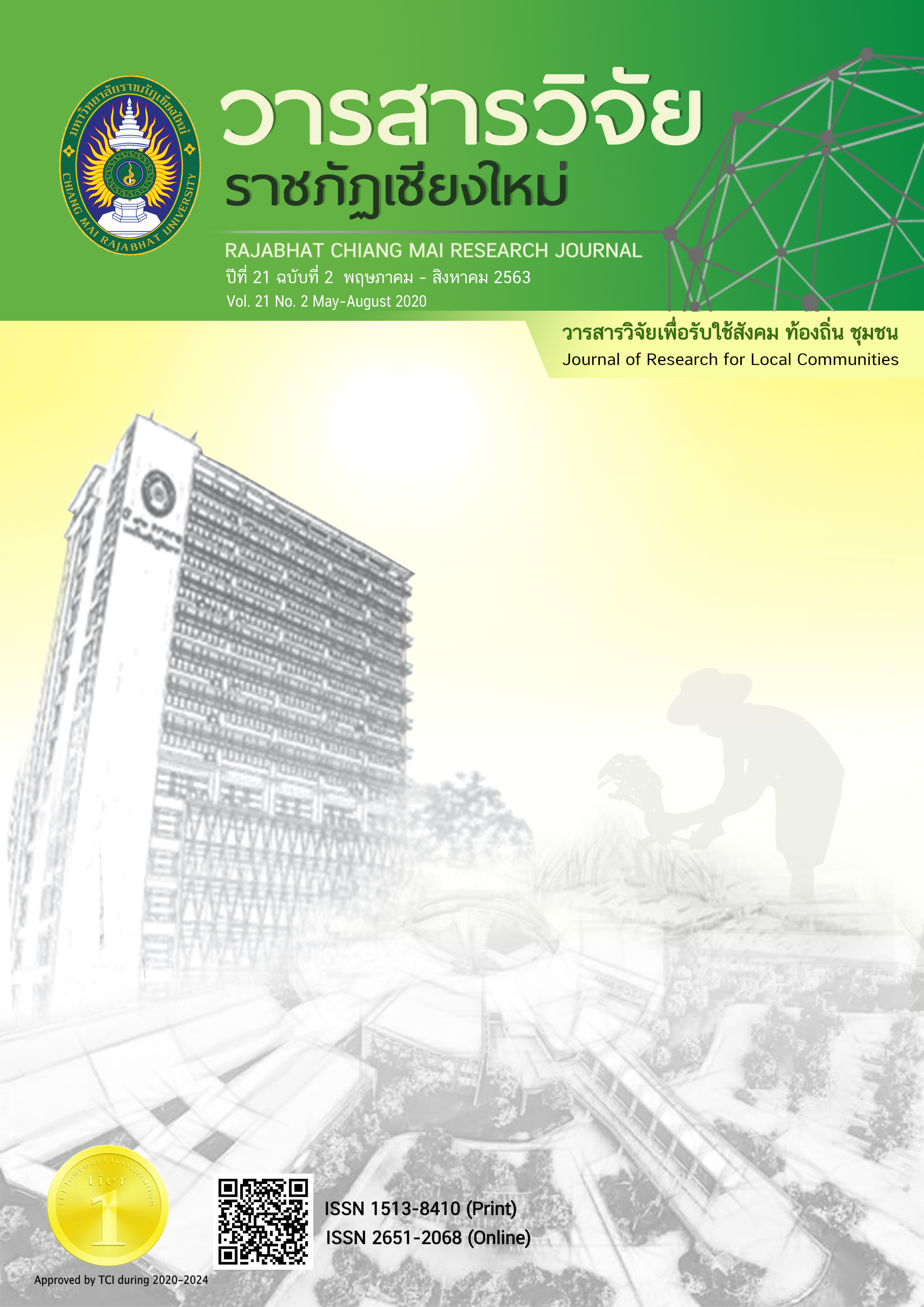The Synthesis of Physical Exercise Postures for Reducing Shoulder Pain in Elderly People Using Decision Table Technique
DOI:
https://doi.org/10.14456/rcmrj.2020.238506Keywords:
Physical exercise postures, Shoulder pain, ElderlyAbstract
The purpose of this applied research was to 1) study and survey position of elderly shoulder pain 2) Synthesizing posture exercises for reducing shoulder pain in the elderly. The research methodology is interviewing a sample of 384 elderlies calculated by Cochran’s equation and analyzed using descriptive statistics. The level of confidence is 95 percent. It found that the elderly had most of the elderly are female, 68%, aged between 66-70 years, 39.6%. In addition, the elderly had the most pain in the shoulder area, 36.2%, followed by the neck and shoulder 29.4%, the shoulder and upper back 28.6%. The researchers synthesized a set of posture exercises to reduce pain in the shoulder area from the Thai physical exercise postures: Ruesi Datton posture, Thai Prasit posture, Thai Pran posture, and Maneeivej posture. There are comparisons with anatomy and synthesize all the exercise postures to check the correctness of the posture by a medical expert, physical therapist, and physiotherapist. After that, the information has been audited to test the decision model for deciding the right posture for the position that has the symptom.
The result of the synthesis of posture exercises to reduce pain in the shoulder area found that 5 sets of appropriate posture exercises are set 1) 35 posture for reducing shoulder and front body, set 2) 23 posture to reduce shoulder and back pain, set 3) 26 posture for pain relief around the shoulders and upper arms, set 4) 23 posture for pain relief in the scapula, and set 5) 23 posture for reducing pain in the shoulder and upper back. In which every pose has been tried and practiced and has been added by Thai traditional medicine Physical therapists to be connected and continuous in the movement and have a positive effect on the use of posture in practical work.
References
Banyati, P. (2017). Sustainable Well-Being: The Issues that Thai Society should not be Overlooked. The Department of Medical Sciences, Ministry of Public Health. Retrieved from http://www.aihd.mahidol.ac.th/new/th/pdf/pichet (In Thai)
Chaimay, P., Khaonuan, B., & Thongsiri, P. (2011). Quality of Life Daily Activity Ability Among Elderly People in Laem Tanot Sub-District, Khuan Khanun District, Phatthalung Province. Journal of public Health, 42(1), 54-63. (In Thai)
Cochran, W. G. (1977). Sampling Techniques. (3rded.). New York: John Wiley&Sons.
Department of Older Person Ministry of Social Development and Human security. (2017). Self-Care and knowledge Set Develop the Elderly Potential and Human “Good Health”. Bangkok: Department of Older Person Ministry of Social Development and Human Security. (In Thai)
Helme, R. D., & Gibson, S. J. (2001). The Epidemiology of Pain in Elderly People. Clin Geriatr Med, 3 (17), 417-431.
Peangcham, W. (2010). Health Promotion for People Who had Muscle Aches Problem with Local Wisdom. Journal of Nakhonratchasima College, 4 (2), 27-35. (In Thai)
Praphasanon, M. (2006). Thai Massage: Therapy Touch for Health. (4thed). Bangkok: Matichon. (In Thai)
Sukwatjanee, A. (2012). Exercise for Elders. Journal of Srinakkharinwirot Research and Development (Humanities and Social Sciences), 4(8), 216-223. (In Thai)
Supawatanakul, D. (2011). A Development of Local Wisdom Coconut Shell Food Massage of Dulapithan Model of Reduction of Sensory Loss in Diabetic Patients. (Doctoral Dissertation, Technology Management Phranakhon Rajabhat University). (In Thai)
The Thai Health Promotion Foundation. (2012). The Incidence of Osteoarthritis in Elderly. Retrieved from http://www.thaihealth.or.th/Content/3567 (In Thai)
Thongdee, C., Rongmuang, D., & Nakachati, C. (2012). Health Status, Quality of Life among the Elderly, Muslim, the South Border Province of Thailand. Nursing Journal of the Ministry of Public Health, 22(3),88-99. (In Thai)
Downloads
Published
How to Cite
Issue
Section
License
1. Articles, information, content, images, etc published in the “Community and Social Development Journal” are copyrighted by the Community and Social Development Journal, Chiang Mai Rajabhat University. In order to properly distribute the articles through print and electronic media, the authors still hold the copyright for the published articles under the Creative Commons Attribution (CC BY) license, which allows the re-distribution of the articles in other sources. References must be made to the articles in the journal. The authors are responsible for requesting permission to reproduce copyrighted content from other sources.
2. The content of the articles appearing in the journal is the direct responsibility of the article authors. The editorial board of the journal does not necessarily agree with or share any responsibility.













